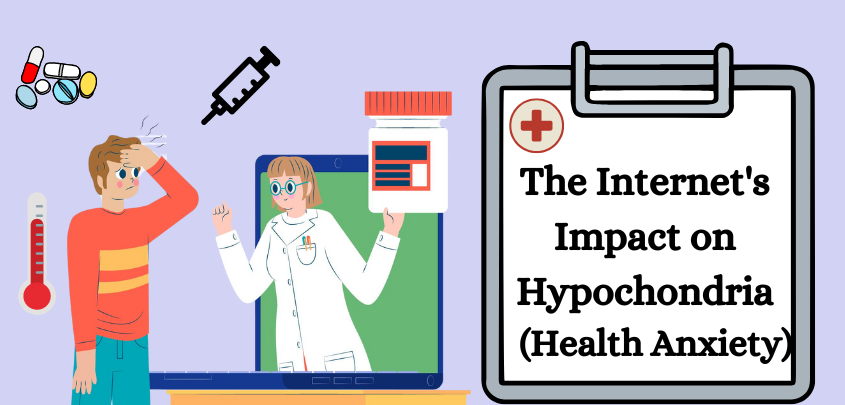
22, May, 2024
Addressing the Impact of the Internet on Hypochondria (Health Anxiety)
The way that people obtain information has changed dramatically in the current digital era, especially when it comes to health. While this accessibility allows people to better manage their health, it also raises a serious concern: hypochondria, which is exacerbated by the internet. In this article, we’ll delve into the intricate relationship between hypochondria and the online world, shedding light on the distinct phenomena of hypochondria and cyberchondria.
Understanding Hypochondria:
Hypochondria, also known as Illness Anxiety Disorder, is excessive concern and fear of a major medical illness. Despite medical practitioners’ reassurances, people suffering from hypochondria sometimes misunderstand typical physical feelings as indicators of serious illness. This disorder drastically impacts everyday function and quality of life.
Enter Cyberchondria:
Cyberchondria arises as another form of hypochondria, fueled by the massive amount of health information available online. Unlike typical hypochondria, which may include studying medical encyclopedias or seeking reassurance from doctors, cyberchondria is distinguished by obsessive online searches for health-related information. This constant search for explanations frequently results in increased anxiety and a cycle of growing concerns.
The Internet’s Role in Increasing Health Anxiety:
The internet serves as a breeding ground for cyberchondria due to several key factors:
- Information Overload: With a simple online search, people can get a wealth of medical information, ranging from reliable sources to questionable websites and personal experiences. The amount of data, which is sometimes contradictory, can overwhelm and confuse people, increasing health concerns.
- Confirmation Bias: Cyberchondriacs perceive each vague symptom or sensation as confirmation of a dangerous ailment, which fuels their anxieties. The anonymity of online forums, along with the echo chamber effect, exacerbates confirmation bias, as people seek validation from those who share their concerns.
- Accessibility to Worst-Case Scenarios: While medical websites strive to give complete information, they frequently feature information concerning uncommon or severe disorders alongside common ailments. Cyberchondriacs are more inclined to focus on the worst-case scenarios, exacerbating their fears and influencing their perception of risk.
- Social Media Influence: Social media sites frequently include personal tales and stories about health issues, which can unintentionally contribute to increased health concerns. Individuals may compare their symptoms to those reported online, resulting in heightened anxiety and self-diagnosis based on personal experience rather than medical knowledge.
Strategies for Managing Health Anxiety Online:
Despite the challenges posed by the internet, there are strategies individuals can employ to manage cyberchondria and promote a healthier relationship with online health information:
- Evaluate Sources Critically: Stick to trusted websites recommended by medical professionals or government health bodies. Be skeptical of extreme or fear-mongering content, and use evidence-based data.
- Set Boundaries: Limit your time spent looking for health information online and avoid excessive worrying. Establishing boundaries can help you avoid falling into a cycle of worry and obsession.
- Practice Self-Compassion: Recognize that it is acceptable to have health concerns on occasion, but avoid overreacting to mild symptoms. Practice self-compassion and seek help from trusted loved ones or mental health specialists as needed.
- Seek Professional Support:If hypochondria has a substantial influence on your everyday life and well-being, consider obtaining help from a mental health professional, such as a therapist or counselor. Cognitive-behavioral therapy (CBT) techniques can be especially helpful in addressing negative behaviors related with hypochondria and building coping mechanisms to manage health concerns
Conclusion:
In conclusion, while the internet has improved access to health information, it can also increase the risk of hypochondria. Understanding the nature of cyberchondria and employing preventive solutions might help individuals navigate the online realm more successfully and lessen excessive health concerns. Remember, obtaining advice from trained healthcare professionals remains critical in controlling hypochondria and promoting general well-being in the digital age.
